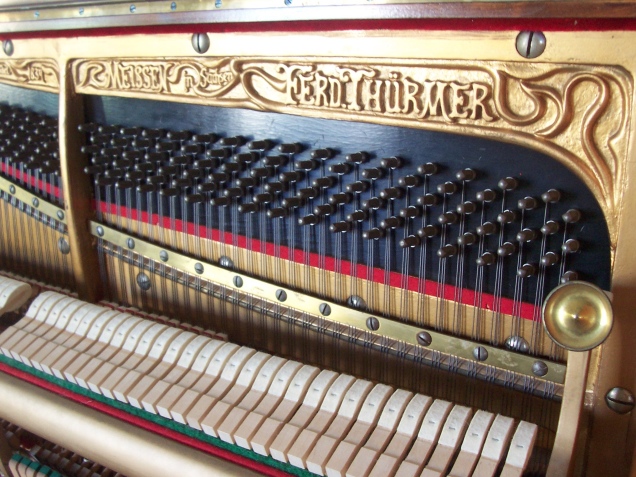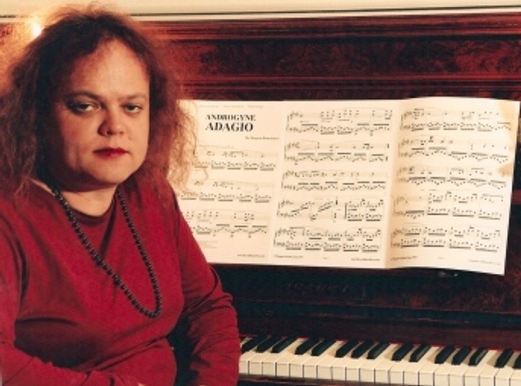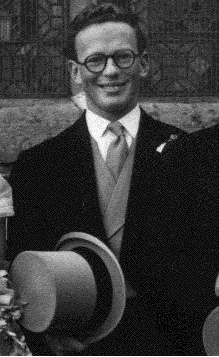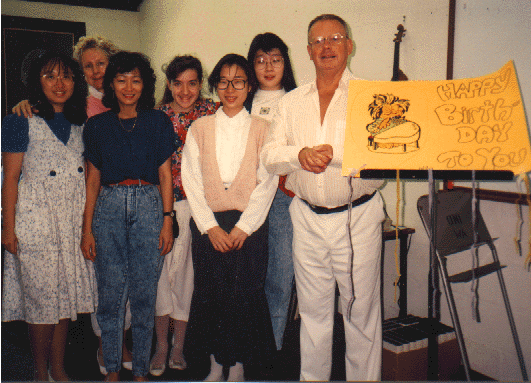My sites
PIANO PAGES HOME
SINGING SITE HOME
RESOURCE REVIEWS
Entry Portal
BLOG
(leave a comment)
Facebook:
MixMargaretDylanJones
SoundCloud
(free recordings)
YouTube (videos)
Site List
Mix Margaret Dylan Jones
W.A. composer, pianist,
teacher, article writer, lyricist
In Memoriam
BRIAN GEOFFREY MICHELL
28 March 1933 - 14 March 2000This page is dedicated to the memory of a wonderful teacher.
On a personal note, I, Margaret Jones, thank my lucky stars that Brian took me on as a first year piano student in 1979. I can attest to these comments in John's eulogy: "...Brian did not try to turn his students into clones of himself..." and "[he had the] ability to transform statue-like students into keyboard practitioners capable of interpreting...great music."
While I have since developed a very different approach to piano playing, especially since early 2014 in regard to technique (which is to be expected with the passage of time), I wouldn't have survived the piano parts of my course if I had not studied with Brian. That much is certain.
More material can be uploaded to this site. Feel free to email the web master (see below) with anything to add, or comments and requests.
Here is Mark's tribute, as printed in the programme note for a free lunchtime concert on 16 March 2000 at the Octagon Theatre, University of Western Australia:
In Memory of Brian Michell
My former colleague Brian Michell passed away at home on Tuesday 14 March. He had retired from UWA in 1993 after many years as Director of Keyboard Studies in the School of Music and he remained actively involved in teaching and examining until just recently. Educated in London and Paris, Brian brought a highly-cultured sensibility to his teaching. He was a most committed teacher, working long hours, often seven days a week. Some of us speculated at one stage whether Brian actually taught on Christmas Day, but no one ever came into the School of Music to check!
Although he was never my teacher, he taught me much about piano playing and helped me make the transition from student to professional. He was a warm and generous colleague, an eloquent and charming host and a supportive and loyal friend. Brian made an important contribution to the development of piano pedagogy in Western Australia.
I dedicate this recital to his memory.
Mark Coughlan
- Mark's programme:
- Vallee d'Obermann (from Years of Pilgrimage Book 1) by Franz Liszt (1811-1886)
- Six Pieces for Piano Op. 118 by Johannes Brahms (1833-1897):
- Intermezzo, Intermezzo, Ballade, Intermezzo, Romance, Intermezzo.
Brian in 1990 with students:
Mary Tan, Verna Adams, Angie Chen, Jacinta Jakovcevic, Florence Kam and Sheau Iong Yeoh.
- Submissions of more material for this site are most welcome. Would you like to add a link? Email the web master M Jones.
Brian Michell
Eulogy by Emeritus Professer John Scott, used with permission.
Brian was born, the son of a doctor in New South Wales, at Broken Hill, on the 28 March 1933. In other words, next Tuesday Brian would have celebrated his sixty-seventh birthday.
I am sure you all realize that it is impossible to sum up any human life in words and a brief space of time, let alone 67 years of experience of what I can only refer to as the human condition on this earth (la condition humaine, to quote Brian’s beloved French). But please bear with me.Brian grew up during the years of the Great Depression, followed by the Second World War. Brian’s father decided that his children should be educated in England. In bleak, post-war austerity London, Brian studied at the prestigious Royal Academy of Music, gaining his Teacher’s Diploma for the piano (Licenciate of the Royal Academy of Music) in 1952 and his Performer’s Diploma (Associate of the Royal Academy) in 1954: two invaluable, internationally recognized qualifications. However, Brian was not yet ready to concentrate on a career as a teacher. He wisely decided to move to Paris, where he stayed for some seven years. There, he studied with the famous teacher Marguerite Long and with Jean Boguet. In 1960, he was awarded two scholarships by the French government that enabled him to study privately with Magda Tagliaferro.
From 1965 to 1970, he returned to England and tutored at the Coloma College of Education, as well as at the University of London Institute of Education.
For a further period of six years, beginning in 1970, Brian taught as Tutor in Pianoforte at the Jamaica School of Music. During that time the Jamaican Government asked him to reorganize the School of Music as Director. In April 1975, Brian returned to France to undertake further studies with Magda Tagliaferro and then, in 1976, he took up residence in Australia.
The following year (1977, the year I first visited Perth), Brian joined the staff of the Department of Music at The University of Western Australia. In 1985, he was appointed Senior Tutor, concentrating on organizing and directing keyboard studies for both performers and teachers. Visiting pianists who gave classes for his students included Ronald Smith, Claude Helffer, and Oxana Yabonskàya. In 1991, Brian was awarded the degree of Master of Music Education for his research into the topic of “Dalcroze and Piano Playing.” That same year saw the introduction of the Bachelor of Music for Teaching, a specialist degree specially designed for studio piano teachers in Australia and overseas.
Brian also acted as a Senior Examiner for the Australian Music Examinations Board, and was a member of the Specialist Keyboard Panel in Western Australia for the Board.
But most of you know many of these facts. In any case, they give only a very faint sketch of WHO Brian Michell was and what he did for so many of us. Such a biography does not begin to touch what Wordsworth called:
… that best portion of a good man’s life;
His little, nameless, unremembered acts
Of kindness and of love.More significant in some ways than these dates and facts I have just outlined is a small detail, but one which goes straight to the heart of Brian’s personality, his utter indifference to material things, is the fact that in his home the only real piece of furniture he cared for was his piano – and one of his two tables turned out to be a tablecloth spread over a collection of the Perth Yellow Pages – some ten or twelve years of them, stacked up on the floor!
Wordsworth mentions kindness, and kindness was an essential part of Brian’s nature. That reminds me of the advice given to a new don who had just arrived at a Cambridge College. He was told by a senior colleague: “It’s no use trying to be clever – we are all clever here; just try to be KIND.” How wonderful universities would be, if only this advice were heeded more often!
We shall always remember Brian as someone who devoted his life to the service of music: “Music, the greatest good that mortals know,” as Addison once claimed. It may seem incredible now to learn that the Faculty of Arts at UWA consistently opposed the introduction of Music into the University – until 1953, when music entered through a side door with the appointment of that musical dynamo, Frank Callaway. Only a few years later, music had taken its rightful place as an essential element, in fact as one of the crown jewels of our University. Those of you who know the words from The Merchant of Venice set to music by Vaughan Williams may well be thinking: “The university that hath no music in itself [as some of our economic rationalists would prefer] … Is fit for treasons, stratagems, and spoils.”
Now, one of the absurd clichés that are mouthed against the way universities teach music is that they concentrate so much on theory and scholarship that they tend to ignore that music is meant to be performed. You are no doubt familiar with Sir Thomas Beecham’s quip that “A musicologist is a man who can read music but can’t hear it.” Well, under the stewardship of such leaders as Sir Frank Callaway and David Tunley, the School of Music at UWA is living proof that this is not so. When music was first introduced at the university as an academic discipline, Mr Callaway (as he then was) asserted his firm conviction that performance is an essential part of the study of music, for “without practical musical experience, knowledge of music is mere coxcombry” – or, as Frank would say in more familiar mood, “He who chops his own wood warms himself twice” – in other words, making music in public, as well as studying it in private, is the only way to go.
Brian Michell fitted in well with such a philosophy. He was above all a superb teacher who devoted immense time and energy to the craft of piano-playing as an interpretation of the composer’s ideals, although towards the end of his career he also developed a passionate interest in research – a passion which allowed him to complete a thesis for the higher degree of Master of Music Education, as I mentioned earlier.
Most of you are here because of Brian the teacher. So, let me quote the authoritative judgment of David Tunley: that as a teacher Brian was quite simply “unique.” His students ranged over all ages and backgrounds and aptitudes – from the anonymous to the Chancellor of this University, Professor Alex Cohen. And to each individual Brian devoted the same care, encouragement, and attention. In this, he was truly all things to all persons, a man for all seasons. A truly great teacher – unlike so many great teachers, Brian did not try to turn his students into clones of himself or anyone else. The individual’s abilities were identified, recognized, and nurtured – to such an extent that the individual was often led to transcend his or her natural limitations. You know, I cannot help thinking of the ancient myth of Pygmalion, a king of Cyprus, who became so enamoured of the statue he was carving that he implored the goddess Aphrodite to endow it with life. The story is told in Ovid’s Metamorphoses and is recalled in the final scene of Shakespeare’s The Winter’s Tale. As David Tunley well knows, it was treated lightly in a one-act opera by Rameau, which in turn inspired a more idealistic interpretation from the pen of Jean-Jacques Rousseau. But I am perhaps straying [No, I WON’T MENTION SHAW AND MY FAIR LADY!] …Why did I think of Pygmalion? Because he was unique in creating a sculpture that came to life. And Brian had a certain Pygmalion-like touch in his ability to transform statue-like students into keyboard practitioners capable of interpreting the complexity and life-giving force of great music.
Brian so loved French culture and the French language that we would often converse in French (French is in fact my native language). In fact, a few days before he died, I told him that I had just listened to the third piano concerto by Saint Saens – and I was able to mention the fact that, by an extraordinary coincidence, many years ago in Bordeaux I met Madame Saint Saens, the composer’s widow, at my aunt’s house. An extraordinary link with a composer who was born in 1835!
Before we listen to David’s reading and the final music (“Après un rêve” by Fauré: “after a dream” – the title is appropriate enough if we recall Hamlet’s words, “To die, to sleep, To sleep, perchance to dream”), I should like to thank all those who helped and looked after Brian, especially in his time of trouble, and on behalf of us all here today, I want to thank David Tunley for the affection, time and energy he has put into organizing this commemoration. I want to end by paying tribute to the two chief strands in Brian’s life, his native heritage and his adopted culture, by reading first some lines by Stephen Spender which I trust you will find reflect the quintessence of Brian’s life and then a short poem by the great nineteenth-century French poet, Charles Baudelaire.
I think continually of those …
Who, from the womb, remembered the soul’s history
Through corridors of light where the hours are suns,
Endless and singing …
What is precious is never to forget
The essential delight of the blood drawn from ageless springs
Breaking through rocks in worlds before our earth …
Never to allow gradually the traffic to smother
With noise and fog, the flowering of the Spirit.
Near the snow, near the sun, in the highest fields,
See how these names are fêted by the waving grass …
The names of those …
Born of the sun, they travelled a short while toward the sun
And left the vivid air signed with their honour.Now, the poem by Baudelaire. Now known as Music, its first title was Beethoven. Here, the poet, who was a great lover of both music and painting, tells how music often carries him away like a sea, and under a canopy of mist or in the vast heavens he sets sail for his faint star. Breasting the swell, he like a ship, experiencing fair winds as well as tempests. At other times, music is like a flat calm sea which mirrors his anguish:
La Musique
La musique souvent me prend comme une mer!
Vers ma pâle étoile,
Sous un plafond de brume ou dans un vaste éther,
Je mets à la voile;
La poitrine en avant et les poumons gonflés
Comme de la toile,
J’escalade le dos des flots amoncelés
Que la nuit me voile;
Je sens vibrer en moi toutes les passions
D’un vaisseau qui souffre;
Le bon vent, la tempête et ses convulsions
Sur l’immense gouffre
Me bercent. D’autres fois, calme plat, grand miroir
De mon désespoir!
After listening to David’s reading and while listening to Aprés un rêve, I would ask you to join me in thanking Brian for having helped so many of us to enter more deeply into the divine spirit of Music –- for having helped us to catch a glimpse of what Schubert’s song calls eine bessere Welt, a better world. As Heine teaches us:
When words leave off, music begins
Initial Brian MIchell In Memoriam page first uploaded on 20000318.


Margaret Jones,
studied with Brian
from 1979

